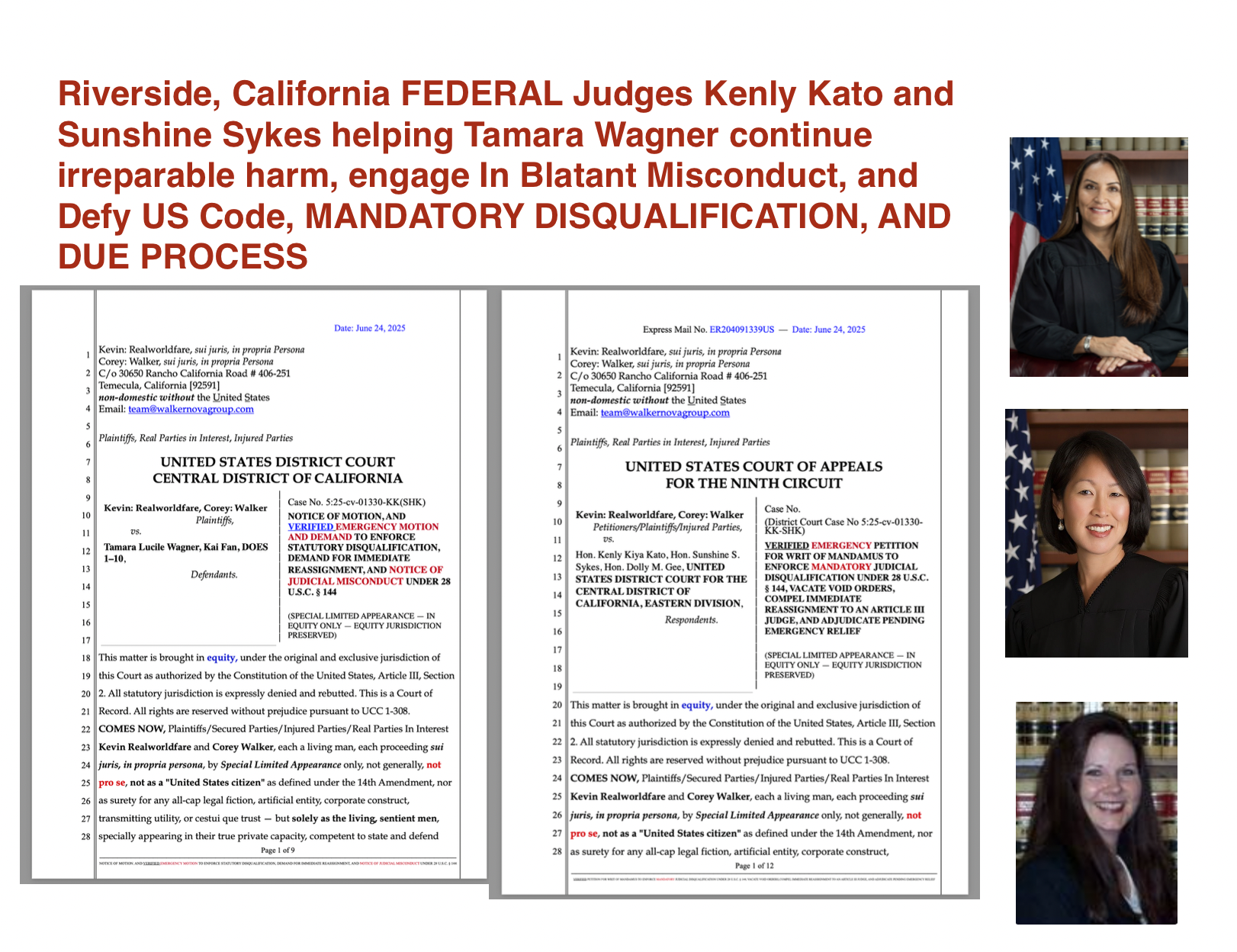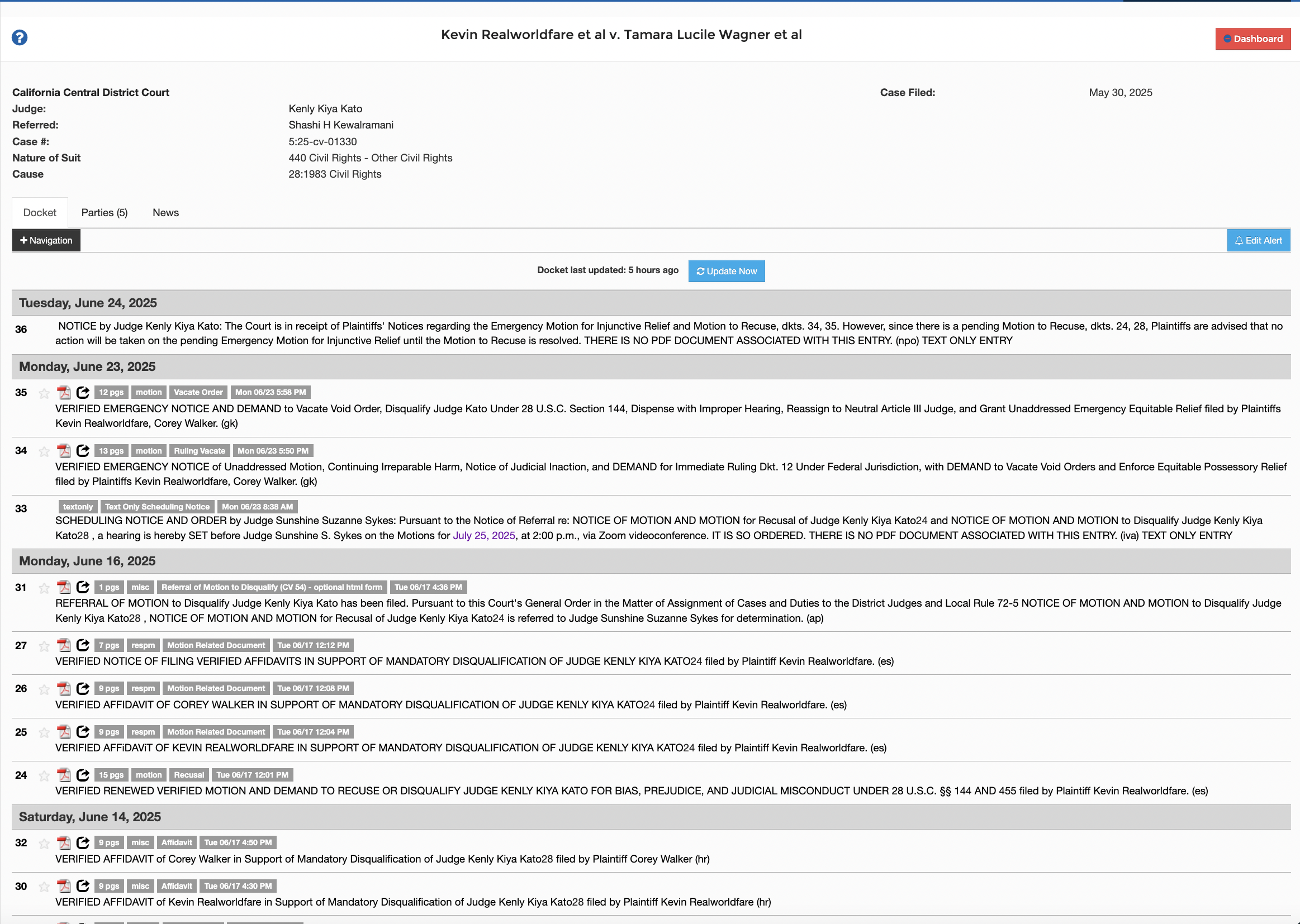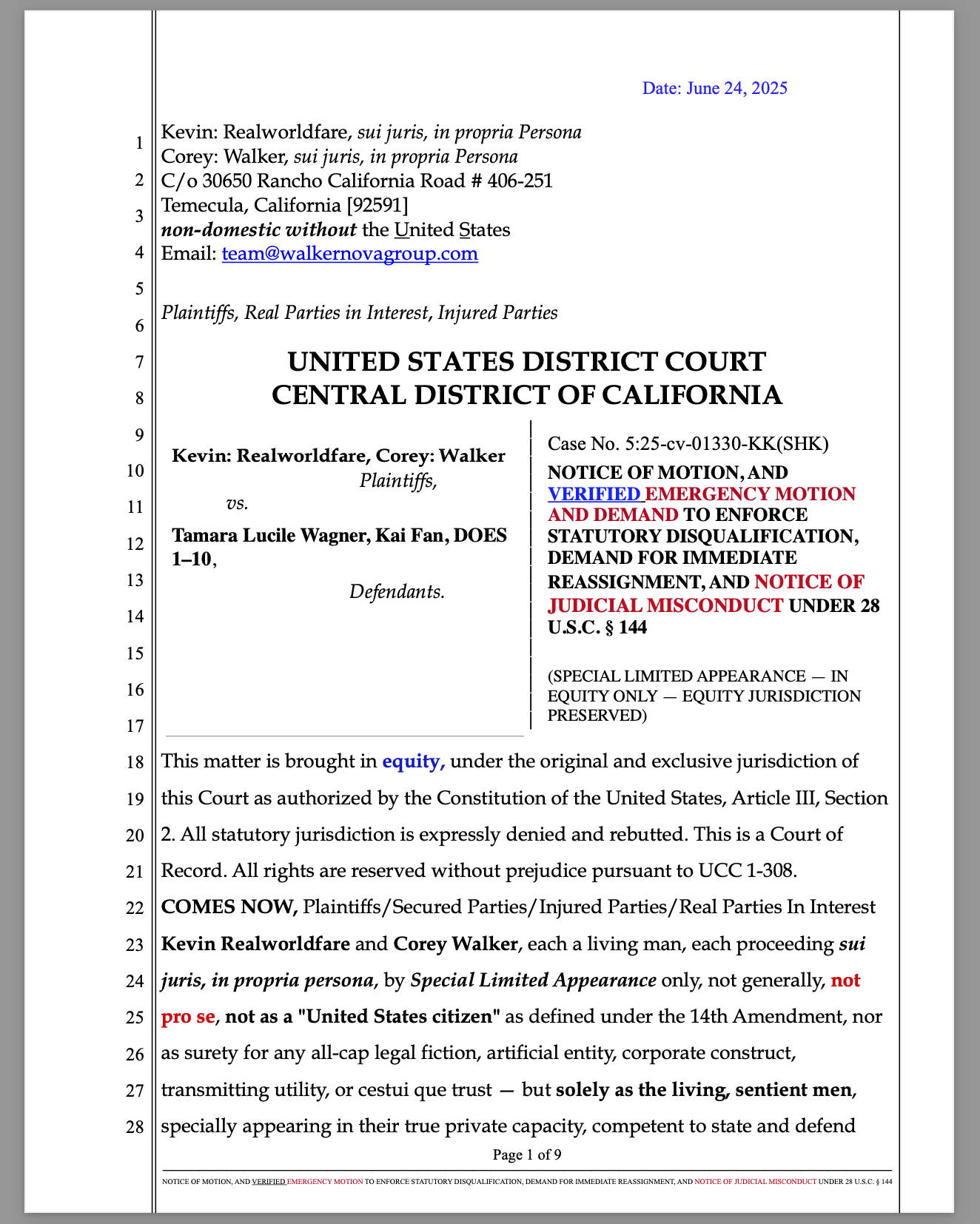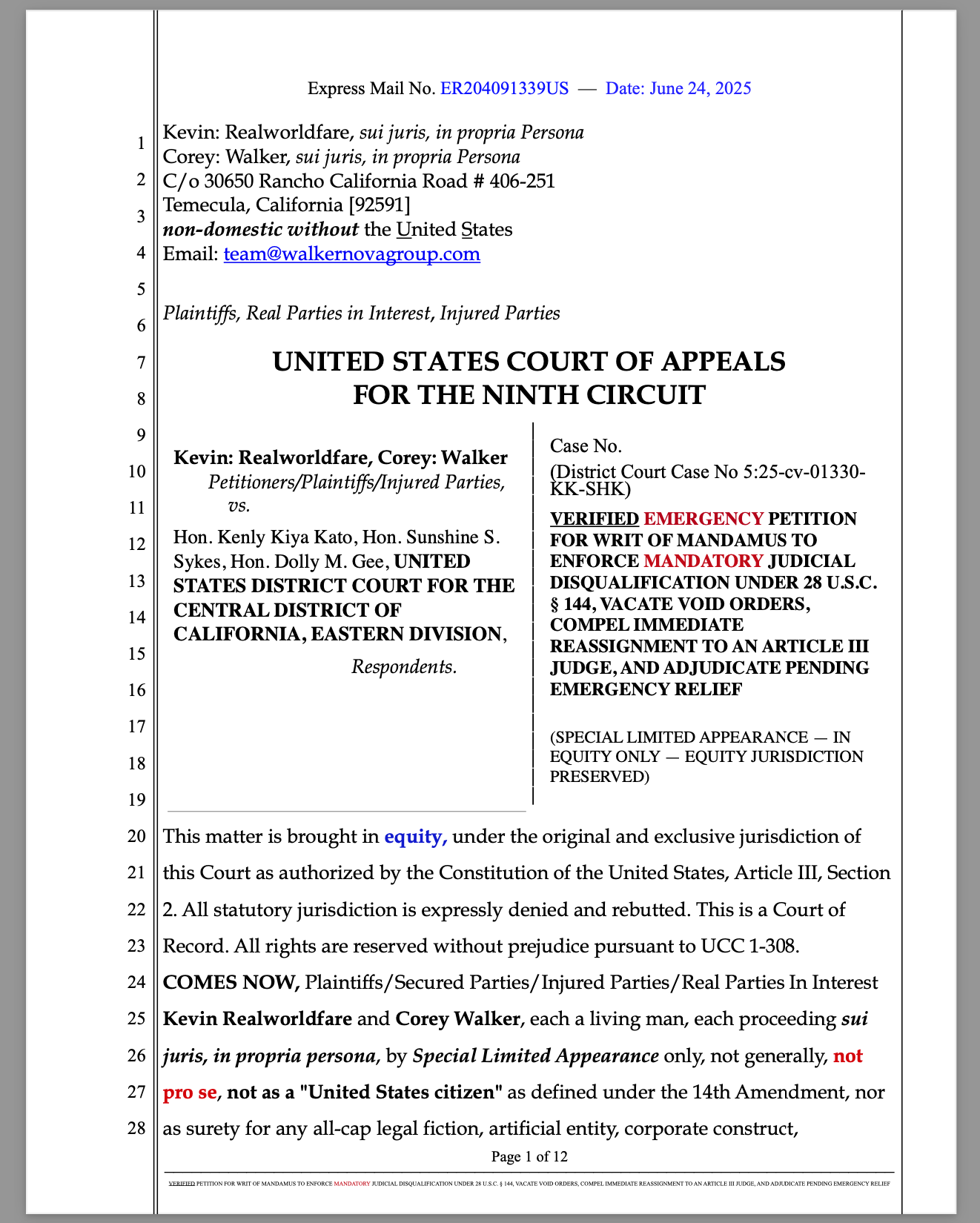In an unthinkable display of judicial defiance, the United States District Court for the Central District of California—specifically Judge Kenly Kiya Kato—has openly violated federal disqualification statutes and constitutional protections, triggering a full-scale procedural breakdown. The Plaintiffs, Kevin Realworldfare and Corey Walker, filed a timely and sufficient affidavit of bias under 28 U.S.C. § 144—invoking a mandatory disqualification. Yet, Judge Kato continues to issue orders and direct proceedings as if the law simply does not apply to her.This is not a mere procedural oversight. This is a calculated refusal to follow the law, a violation of the U.S. Constitution, and an unmistakable act of judicial misconduct.
THE JUDICIARY IS ON TRIAL:
Ultra Vires Actions, Mandatory Disqualification, and the Collapse of Due Process in the Central District of California
I. INTRODUCTION: THE RULE OF LAW IS UNDER ATTACK
In an unthinkable display of judicial defiance, the United States District Court for the Central District of California—specifically Judge Kenly Kiya Kato—has openly violated federal disqualification statutes and constitutional protections, triggering a full-scale procedural breakdown. The Plaintiffs, Kevin Realworldfare and Corey Walker, filed a timely and sufficient affidavit of bias under 28 U.S.C. § 144—invoking a mandatory disqualification. Yet, Judge Kato continues to issue orders and direct proceedings as if the law simply does not apply to her.
This is not a mere procedural oversight. This is a calculated refusal to follow the law, a violation of the U.S. Constitution, and an unmistakable act of judicial misconduct.
II. THE LAW IS CLEAR: DISQUALIFICATION IS MANDATORY
Under 28 U.S.C. § 144, when a party to a proceeding files a “timely and sufficient affidavit” alleging personal bias or prejudice by a judge, that judge must immediately cease participation in the case. This statute is not discretionary it is mandatory. As held in Berger v. United States, 255 U.S. 22 (1921), and reinforced in United States v. Sibla, 624 F.2d 864 (9th Cir. 1980), a judge cannot review or rule on their own disqualification:
“The judge against whom an affidavit is filed shall proceed no further.” — 28 U.S.C. § 144
“The disqualification is automatic; the judge has no discretion.” — Berger, 255 U.S. at 35
Judge Kato’s continued involvement after verified affidavits were filed is a nullity in law. Every action taken since then is void ab initio, without legal force or effect.
III. ULTRA VIRES ORDERS AND ONGOING JUDICIAL MISCONDUCT
Despite her statutory disqualification, Judge Kato issued a “Text Only Entry” on June 23, 2025, acknowledging emergency filings (Dkts. 34 and 35) and falsely claiming that no action would be taken until her own disqualification was resolved. This is a textbook example of an ultra vires act—one taken without jurisdiction and in defiance of statutory divestiture.
Such conduct is directly barred by law. In Sibla, the Ninth Circuit reaffirmed:
“Once the affidavit is filed and determined to be legally sufficient on its face, the judge loses authority to act.”
Even administrative docketing or clerical “notices” issued by the disqualified judge are void. The law does not permit a disqualified judge to pause proceedings pending her own review; the statute itself does the pausing.
IV. COLLUSION AND CONFLICT: THE SHADOW OF RIVERSIDE COUNTY
Judge Sunshine Suzanne Sykes, to whom the disqualification motion was referred, previously served on the bench of Riverside County—the very jurisdiction of Defendant Judge Tamara Lucile Wagner, a named party in the case. This connection taints the proceedings with an appearance of bias and conflict of interest.
The integrity of judicial recusal cannot be preserved when one former colleague is tasked with reviewing the conduct of another. The perception of collusion is unavoidable—and in matters of due process, even the appearance of impropriety is enough to disqualify. See Liljeberg v. Health Services Acquisition Corp., 486 U.S. 847 (1988).
V. IRREPARABLE HARM AND CONTINUING INJURY
The Plaintiffs have suffered and continue to suffer irreparable harm as a direct result of the Court’s refusal to act. They were unlawfully dispossessed of their property under color of law and remain deprived of possession, shelter, and equity.
Their Emergency Motion for Injunctive Relief (Dkt. 12)—requesting immediate restoration of property rights and equitable remedy—has remained unadjudicated for over two weeks.
The Court’s willful delay violates the Plaintiffs’ Fifth Amendment right to due process and contravenes the purpose of Fed. R. Civ. P. 65 governing emergency injunctive relief. As held in Goldberg v. Kelly, 397 U.S. 254 (1970), and Mathews v. Eldridge, 424 U.S. 319 (1976), the denial or delay of a hearing in the face of ongoing harm constitutes a constitutional violation.
VI. THE MANDAMUS PETITION: A LAST DEFENSE AGAINST TYRANNY
Faced with judicial obstruction, Plaintiffs have filed a Verified Petition for Writ of Mandamus in the Ninth Circuit Court of Appeals. The Petition seeks:
-
Immediate enforcement of Judge Kato’s disqualification;
-
Vacatur of all void orders;
-
Reassignment to a neutral, Article III judge;
-
Adjudication of the unaddressed Emergency Motion for Possessory Relief (Dkt. 12).
Mandamus is proper where a party has no other adequate remedy, where the harm is irreparable, and where the duty to act is ministerial—not discretionary. Bauman v. U.S. District Court, 557 F.2d 650 (9th Cir. 1977).
VII. CONCLUSION: THE JUDICIARY IS BEING TESTED
The judicial branch was created to be a check on power, not a tool of suppression or convenience. What is unfolding in this case is nothing short of systemic abuse: disqualified judges acting as if they still have jurisdiction, ignored emergency filings, and deliberate procedural obfuscation—all while families remain homeless, dispossessed, and unheard.
If the Ninth Circuit fails to act decisively, the message is clear: Federal courts are free to ignore statutory disqualification, withhold emergency relief, and violate due process with impunity.
Let it be known: The people are watching. The record is preserved. The Constitution still speaks.
Justice must prevail—or the people will remember who stood in its way.







